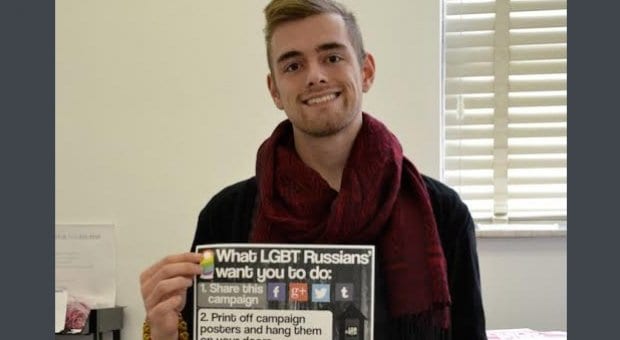As the 2014 Olympics draw nearer, Russia’s ban on “propaganda of nontraditional sexual relations” continues to elicit harsh condemnation. Many have criticized the law’s vagueness with concerns that it may be used to promote anti-gay sentiment and incite acts of violence. Others have called for outright boycotts of the Sochi Games and of Russian exports such as vodka.
Many Russian athletes and LGBT activists, however, have asked the international community to refrain from such boycotts. Their argument is that athletes who have worked their entire lives for the chance to compete should not be denied the opportunity to do so and that the best way to put pressure on the Russian government and President Vladimir Putin to repeal the law is for LGBT athletes and delegates to attend the Games, confronting Russian politicians with their existence.
With so many factors involved, it can be difficult to know how to help. Ottawa-based diversity initiative Jer’s Vision has created the Open the Doors to LGBT Rights in Russia campaign, working collaboratively with Russian activists to identify actions that individuals can take. Jer’s Vision will also present a panel discussion on Feb 7 in collaboration with the Aids Committee of Ottawa, the Ottawa International SOGI Rights Network (OISRN) and Pink Triangle Services to further explore the issue.
“The international community has an obligation to speak out against oppression anywhere it exists, including here in Canada. We need to be very careful about how we respond, though, and ask ourselves, Are we supporting oppressed communities as they wish to be supported?” says Bruce Miller, of OISRN. “Those on the ground will have a much better idea about what they need to further their cause and what will cause more problems.”
This is where the issue of boycotts comes into play; while they can be effective tools to assert international influence, boycotts also sometimes allow those perpetrating bigotry to isolate themselves along with those who are most vulnerable.
“Boycotting doesn’t help. Donating helps,” says Jeremy Dias, founder and director of Jer’s Vision. “Where you invest your money speaks volumes, so investing in companies that are LGBT-friendly and supportive makes a difference.”
Donations to the Jer’s Vision campaign will go to educational initiatives in Russia aimed at de-stigmatizing the LGBT community, as well as more immediate needs. “Give me $500 to send to . . . Equality Russia; what will that pay for? It’ll probably pay to get someone out of jail. It’ll probably pay to put a cast on someone’s body after they got beat up. It will probably pay for a rainbow flag that’s illegal in their country. These are the realities of their battle.”
On the home front, many feel that there is a responsibility on the part of LGBT adults and allies to educate youth on the issue and give them an opportunity to be involved. “I think one of the most important messages for young people to understand is that the modern Olympics were revived to create a global community of acceptance and diversity,” says Mark Frankish, an Ottawa-Carleton District School Board teacher, LGBT activist and sports enthusiast who will be co-moderating the panel discussion. “Global social media can help youth voice their opinions and educate their friends, families and the world.”
There has also been talk about the risks posed to individual athletes who are LGBT and will be competing in the Games.
“LGBT Olympic and Paralympic athletes will be competing in the most important event of their athletic careers, knowing that they do so in a country where the laws violate their rights to be treated equally,” says Jennifer Birch-Jones, who works with the Canadian Association for the Advancement of Women and Sport and Physical Activity (CAAWS) and who will be speaking on the panel. “Each will decide how they personally will choose to deal and respond to the anti-gay law . . . [athletes] can also send a strong message about LGBT rights.”
However, she cautions, “There are also no guarantees that members of the Olympic and Paralympic teams who choose to demonstrate their opposition to the anti-gay law will be free from subsequent sanctions imposed by the IOC or IPC.”
“What is happening in Russia . . . in the legislative framework that Putin is putting forward is that one of the first things they need to do is to make sure that you don’t get to speak about your vulnerability,” says Joanne St Lewis, a law professor at Ottawa University and the panel’s second speaker. “The minute you make whatever that speech . . . is illegal, you literally have a licence to oppress people.
“How do you even displace profoundly corrupted stereotypes about your community if you can’t even organize and speak about your identity?”
In the absence of speech, the message can be sent through actions and, most importantly, through presence. Canada and the United States have both sent Olympic delegations that include openly gay members, while leaders Barack Obama and Stephen Harper will be conspicuously absent. “It’s one thing to have an empty space where you would be, but these [delegates] are now entitled to be in the space where [these leaders] would be, which puts them in proximity with Putin,” St Lewis says. “What all of this is about is about full citizenship and full personhood. You don’t do that by allowing the discriminator to live their life untroubled by your presence.”
Speaking Out on Sochi 2014: A dialogue on LGBT rights in Russia and what you can do
Fri, Feb 7, 7pm
Arts Court Theatre, 2 Daly Ave
jersvision.org/en/events/speaking-out-sochi-2014
Donations are being collected for Russia’s We Equality and St Petersburg Pride
More info and free material is available at jersvision.org/lgbtrussia


 Why you can trust Xtra
Why you can trust Xtra


